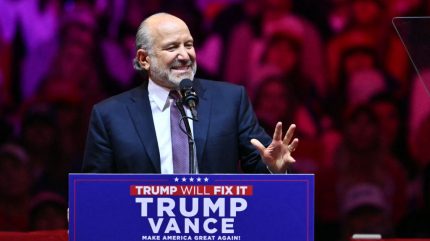
As president-elect Donald Trump continues to roll out his cabinet picks, the competition for treasury secretary has grown tense.
Initially, there were two main contenders, although that candidate pool has now been expanded. Trump’s pick will help indicate whether his tariff plans will be applied to their fullest extent or used more as a negotiating tactic with foreign powers.

Discover B2B Marketing That Performs
Combine business intelligence and editorial excellence to reach engaged professionals across 36 leading media platforms.
Who are the candidates?
The two original candidates for treasury secretary were capital management firm Key Square founder Scott Bessent and former CEO of Cantor Fitzgerald Howard Lutnick.
Bessent is Wall Street’s preferred choice. A top Democratic party donor told the FT that while he hated Trump, he loved his country and “Bessent is a person we can all live with”.
Bessent has said he would want to use tariffs as a negotiating tool, an opinion that has won him support from economic moderates who worry about the chaos that could come from high import tariffs across the board. Economists have said this would hike inflation, a top issue for many voters in the election.
He wants to reduce government borrowing and has criticised Biden’s investment policies. In an op-ed for the Wall Street Journal, he said that the stock rally that followed Trump’s win was proof that warnings from 23 Nobel laureates in economics who warned that a Trump win would be “disastrous” were wrong.

US Tariffs are shifting - will you react or anticipate?
Don’t let policy changes catch you off guard. Stay proactive with real-time data and expert analysis.
By GlobalDataHoward Lutnick would be a more divisive pick. Lutnick is the former CEO of Cantor Fitzgerald and co-chair of Trump’s transition team. He will be central in filling around 4,000 government roles before Trump’s inauguration in January. He was a major donor to the president-elect’s campaign, giving more than $10m and helping raise millions more.
He worries about the consequences of globalisation for US workers and is a stronger proponent of tariffs than Bessent, saying the US should “tariff the rest of the world and keep them the heck out”. Lutnick is also a proponent of tax cuts and deregulating cryptocurrency, himself owning “hundreds of millions of dollars” in bitcoin.
Elon Musk and Robert F Kennedy (RFK) Jr have thrown their support behind Lutnick. Musk posted on X, the social media platform he owns, that “Bessent is a business-as-usual choice, whereas @howardlutnick will actually enact change”. He added that “business-as-usual is driving America bankrupt, so we need change”.
However, a source told the New York Times that Trump was growing increasingly annoyed with Lutnick, who he suspected of wielding the transition process to benefit himself.
The candidate pool then widened to include a few more names.
Kevin Warsh was a Federal Reserve governor between 2006 and 2011 and served as economic advisor to President George W Bush during his second term. During Trump’s first term, Warsh was considered for the position of Federal Reserve Chair, which ended up going to Jerome Powell. Trump has since regretted choosing Powell for the role.
In October, Warsh criticised the Fed for seeming to not “have a serious theory of inflation” and for mishandling rising costs. He wrote that, in his view, “irresponsible government spending and excessive money printing are largely to blame for triggering inflation in the first place”.
Marc Rowan is the CEO of Apollo Global Management, a firm managing nearly $700bn in assets. His economic positions are mostly unknown, although he has said that Trump will deliver the “wholesale change” the US economy needs. In early October, he warned that further rate cuts from the Fed could backfire.
Trump is also considering his former US Trade Representative Robert Lighthizer and Republican Tennessee Senator Bill Hagerty.
Use of tariffs and Musk’s shadow rule
Trump’s treasury pick will signal the seriousness of his tariff plans, which if implemented, could have grave consequences for both the US economy and the rest of the world.
It could also be a sneak peak at the extent of Musk’s influence during Trump’s second term. Many have called him America’s new “shadow” ruler, expecting his stance as the world’s richest man to wield him favours from the President-elect. If Trump chooses Lutnick, that narrative will be naturally reinforced.
His cabinet picks so far have ranged from former moderate Republicans like Marco Rubio to full-blown conspiracy theorists like RFK Jr. However, as ever, in this new era of Trumpism, the most determining factor will likely be loyalty to the president and his vision to “make America great again”.





